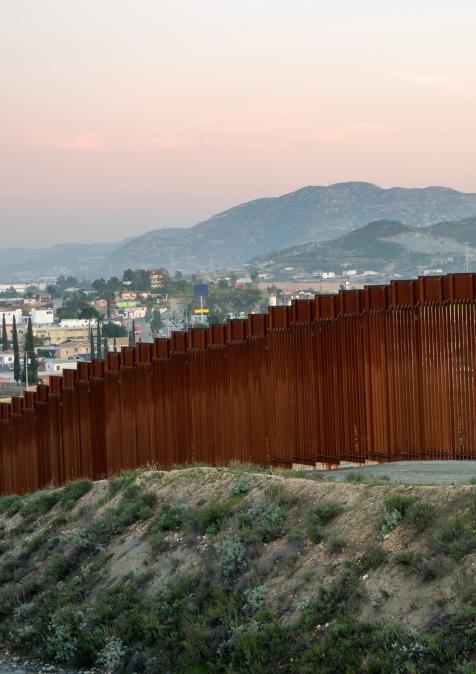Publications /
Opinion
Tanks Are Not Yet Deployed
Containers are in place, razor wire and metal barriers, nine meters high. Dogs sniff for illegal intruders, spyware registers noise, alerting border patrol units to people approaching the border, trying to evade National Guard troops. Tanks, mind you, have not yet been deployedon the 1954 miles (3145 kilometer) border between Mexico and the U.S. Migrants who approach dare to pass through ferocious desert, climb harsh mountains, jump on freight trains passing river bridges, and attempt to cross the dangerous Rio Grande, which, for 1254 milesof the border, forms a natural barrier.
Forty-eight U.S./Mexico border crossings, 330 official points of entry, are open for legal,visa-holding travelers. When he was President, Donald Trump attempted to realize a campaign promise: the construction of an impenetrable wall to keep unwanted migrants out,leaving the US in splendid isolation. By the time the plan was interrupted by the election loss to Joe Biden, only a few hundred miles of ‘the wall’ had been completed. In reality, it is a stretch of concrete-filled steel bollards. Migrants continue to reach and cross the border, more than a million in 2022 and 2023. Migrants come in unprecedented numbers. There were an estimated 300,000 encounters between the U.S. border patrol and migrants (including apprehensions and immediate expulsions) in December 2023 alone, and no one knows how many entered the US undetected, to join the more than ten million undocumented migrants, hiding forever in the U.S., and hardly ever deported.
A Shameful Situation
The thousands processed at the border in December 2023 was “the highest number ever recorded”, reported the Voice of America (January 3, 2024). Fifty thousand came throughdesignated points of entry. U.S. Customs and Border Protection registered nearly 2.5 million encounters with migrants along the south-west border from October 2022 to September 2023, reported the Orange County Register (February 27, 2024). More than 80 percent of these encounters occurred between the official ports of entry, in remote desert areas, or mountains in south-eastern San Diego or elsewhere in California, Arizona and Texas. ‘Encounters’include apprehension or expulsion, the often instant decision of U.S. authorities to return migrants immediately to Mexico or grant them a temporary U.S. entry permit, to be confirmed by a judge at a later date. In the last six months nearly 100,000 migrants arrived in the San Diego region, transported by U.S. border authorities into town and dumped into the streets of California with no papers, no cash, no bed.
In February 2024, the Desert News (February 28) wrote about yet another “street release” of migrants, revealing that “Federal, state and local officials disagree on how to help the migrants and who would pay for it”. “Mexico’s situation is untenable”, and the mismanagement by the mighty U.S. deplorable, stated the 71 year old Jorge Castaneda, Mexico’s Minister of Foreign Affairs (2000-2003). “The U.S. immigration system is broken”. Castaneda, distinguished professor of Political Science and Latin American Studies at New York City University, and 2004 candidate for the Presidency of Mexico, gave a sober assessment in our interview at the Atlantic Dialogues conference, organized by the Policy Center for the New South in Marrakech in December 2023. “We have to admit that only in the long term we will be able to stop the flow of migrants”, he said, adding that Mexico is“unable to stop its people from leaving, they have the right to leave”. One credible way of stopping migration, says Castaneda, is “to create conditions which make them stay”.
The record level of border encounters, said the Voice of America, comes “as the U.S. enters a Presidential election, in which the topic of immigration is expected to play a major role”.Donald Trump, reported the BBC (December 28, 2023) has “taken an increasingly hardlinestance on the border and will reportedly unleash a massive crackdown on undocumented migrants if returned to office next year”. Castaneda, in earlier days member of the Mexican Communist Party, and author of a biography on the Argentinian revolutionary Che Guevaraand a 240-page thesis on ‘The Movement of the Revolutionary Left in Chile 1965 – 1972’, argued in his Atlantic Dialogues interview, that a nation of 330 million like the U.S. could easily absorb two or three million migrants, as cheap labor needed on farms, in restaurants, and for work in infrastructure renewal.
Treasonous Work on the Wall
The collapse of Venezuela, political instability and violence in Haiti, a crackdown in Nicaragua, Russia’s invasion of Ukraine, repression in China, and other conflicts have fueleda historic shift in migration patterns. The U.S. registered last year, among the masses trying to reach its territory, 37,000 Chinese asylum seekers (The Conversation, March 11, 2024). In December 2023, U.S. Border Patrol officials confirmed that their teams encountered about 6000 Chinese migrants. Mexico was the single most common origin country for U.S. border encounters in 2023, but Mexican nationals made up less than 30% of the total share, compared with more than 60% a decade ago. Crime and poverty is driving citizens from El Salvador, Nicaragua, Cuba, Honduras, Guatemala, and Colombia across the southernMexican border, 1000 miles from their goal: the U.S.
Their chances of success are slim, but for them hope is more precious than hunger. They walk, sleep in the shadow of a church, and at the end they do not care when and where they sneak into California, or Texas, they just know they will not turn back. Most migrants (54%) are single, according to Pew Research, while 41% travel as family and about 5% areunaccompanied minors. Keeping masses of migrants within the borders of Mexico is nothing less, as Castaneda insisted in our conversation at the Atlantic Dialogues in Marrakech, than “doing the dirty work for the U.S., which seems unable to reform its immigration laws”, creating “squalid conditions” for the stranded migrants. At least, argued Castaneda, thesepeople should be given hope by legalizing their presence in Mexico, and their eventual departure to the U.S., “even if they have to wait one year or two until they ae allowed to live in the U.S., and we find a system to bridge the time”.
Migrants willing to trust the existing migration system are registering at official border postsfor asylum, and are then are forced to return to the unknown in Mexico, where they must waitfor an unknown period. An estimated 225,000 migrants are presently stranded in Mexico,including people from Central America, the Caribbean, South America, Eastern Europe,South East Asia, and sub-Saharan Africa, wrote Reuters (October 6, 2023). Most are “waiting for an opportunity to cross into the U.S.” In the capital and the main border towns in the north and the south of Mexico, the shelters are full, forcing many people to sleep on the streets in unsafe and unsanitary conditions. The backlog of immigration cases in the United States has grown steadily—there were 3.3 million cases pending as of December 2023, but just 682 immigration judges in the U.S., resulting in a three or four year wait for an appointment with an immigration judge. In other words, said the Voice of America, “the American system for governing asylum seekers is deeply broken”. Hundreds of thousands ignore their obligation to meet a judge as suggested, since fewer than half of those asylum claims eventually succeed. Many immigrants will simply not show up and instead disappear into the country, forever undocumented aliens and hardly ever deported.
“Visa overstays far exceed illegal border crossings”, reported Newsweek (January 18, 2019), “and a wall will not change it”. Donald Trump, who in 2016 promised to secure America by building a $28 billion, 1000 mile wall, paid for by the Mexican government and decorated with solar panels, achieved only about 455 miles (732 kilometers) of new construction during his Presidency. The steel bollard wall, at the end financed by Pentagon funds, the formerpresident has had to acknowledge, has not only not held the migrant masses back, but smugglers have breached his wonder wall 3000 times, as the Washington Post revealed (January 29, 2017). Israel’s prime minister, Netanyahu, unsurprisingly, applauded the construction of the wonder wall by his friend Trump, but the Catholic Church of Mexico voiced opposition, and denounced “work on the Trump wall as treason” (Associated Press,March 27, 2017).








